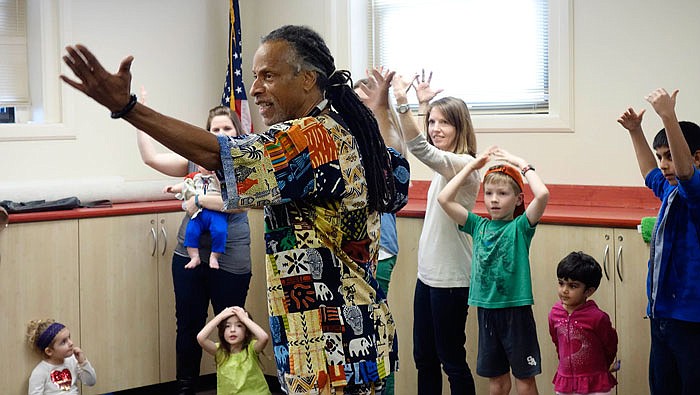Kumana Mtendaji's fingers danced across his flute as the notes he played said hello to a group at the Callaway County Library.
He was there to educate, to laugh and sing, and draw people, shy in their own skins, together with one heart.
"I want to bring forth a nice, peaceful opening," Mtendaji told a group as diverse as an international gate at a major airport. "That song was 'Lift Every Voice and Sing' by James Weldon Johnson. Sing a song for the hope that the present brings us. Every voice means all."
Mtendaji, of the St. Louis area, is an African-American folk artist who doesn't just play traditional drums and percussion instruments. He also is a storyteller and tells a tale in short bursts with audience members often asked to chant it back.
"I travel and talk to kids, and I also teach percussion and African-American folk lore," he said.
As a child growing up in Central Missouri, Mtendaji listened to the poems, riddles, songs and stories told among his family members. He also learned from the words and actions of George Washington Carver, Scott Joplin and Langston Hughes.
"How did you learn to play?" asked a small girl, Olivia.
"I went to school," he replied.
On his visit Monday, Mtendaji brought a djembe (a large drum with a skin cover), a shekere (gourd rattle) and other instruments. He also visited locations in the Daniel Boone Regional Library system. In Fulton, most of the library workers flocked to the Friends Room to hear the music.
"It's amazing what the African influence has done for us," librarian Sherry McBride-Brown said. "What a treat."
Mtendaji said one of his greatest influences was African-American dancer Katherine Dunham (1909-2006) who created the Performing Arts Training Center and the Dunham Dynamic Museum in East St. Louis, Illinois. Mtendaji trained and became a staff drummer of the Performing Arts Training Center.
"Every February, we celebrate African-American history," he said. "It is part of our culture in the United States. The more we know about each other, the better we get along."
He told his attendees about Dr. Carter C . Woodson, called the "father of black history" who launched Negro History Week in February 1926, the precursor of Black History Month. Because he needed to earn money, Woodson didn't receive his high school diploma until he was 22. He became a teacher, then a principal; he earned a bachelors degree, then his masters and finally a doctorate from Harvard University in 1912. He later joined the faculty at Howard University.
"Dr. Carter G. Woodson wasn't a quitter," Mtendaji said. "You don't quit, either. It's not an option."
Twice, Mtendaji gathered a group of children and their adults in a line and taught them dance moves.
"These movements mean stuff," he said. "We don't just do them because they look pretty."
He described some of the thought processes which influenced his life.
"The will of God is the life within each of us," he said, adding the word "God" may be substituted with "creation" or "life."
"Treat each other the way you want to be treated."
Mtendaji said he's happy to visit libraries, museums, schools or any place to create workshops. He has a website at kunamamtendaji.com.

